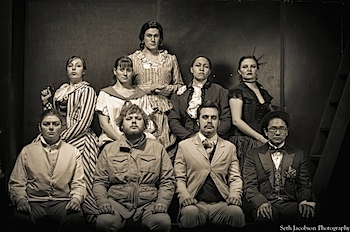CTCs "Cloud Nine" subverts with dark hilarity
 |
| Cloud Nine cast, click to embiggen. Photo by Seth Jacobson Photography. |
These days, it's common to talk about the intersecting systems of oppression that comprise race, gender, and class — we even have a word for them: kyriarchy. But when British playwright Caryl Churchill wrote "Cloud Nine" back in the late 1970s, it was one of the first theatrical works to dissect such hidden power structures, and she did it with a ribald Brechtian comedy that earned her an Obie for its off-Broadway run in 1982.
Wakefield's Contemporary Theater Company, no stranger to challenging works, has mounted a spirited, engaging production that runs through May 3, and if you enjoy Churchill's work (or thought-provoking theatre in general) this is a must-see.
The play's two acts span 100 years, with the first in an 1880s British colony and the second in 1980s London, but for the several characters we follow, only 25 years have elapsed, just one of the many distortions Churchill introduces. She specifies that roles be cast against gender and race, with men playing women, women playing men, and a white actor as a black servant. Helpfully, director Ryan Hartigan begins each act with the players holding identifying cards (another layer of cultural inscription.)
The first act, set in Africa in the days of colonial power, plays like a Restoration comedy, as the veneer of an ideal British family is peeled back to reveal infidelity, repressed sexuality, and violence. Clive, the patriarch, is played by Birk Wozniak with a starched resolve; Andrew Katzman as his wife, Betty, offers a nuanced portrayal as the helpless and dominated anchor of the family tortured by unfulfilled desire. Their son, Edward (played with impetuous energy by Amy Lee Connell) tries to hide his attraction for both dolls and their visitor, the explorer Harry Bagley (Sami Avigdor). Mother-in-law Maud (Tammy Brown), governess Ellen (Stephanie Traversa), and servant Joshua (Ashley Macamaux) round out the household, which is thrown into conflict by native unrest and the arrival of Bagley and the divorced Mrs. Saunders (Traversa).
There ensues a round of assignations, rebuffs, and recriminations, made intentionally stranger by the cross-gender casting: Clive and Mrs. Saunders, Betty and Harry, Ellen and Betty, Harry and Edward (and Joshua, and Clive — well, he's an explorer, no?). Against this backdrop of sexual dalliance, the servant Joshua plays witness and informant, alienated from his own culture to the point that he cannot even grieve the death of his parents at the hands of British troops. But during the marriage that ends act one, we finally see him raise his rifle.
One hundred years later, we find Betty, Edward, and Victoria (now 25 years older) in Thatcher's London, where the veldt has been replaced with spraypainted cinderblock and the last remaining "colony" is Northern Ireland. Betty is now played by Stephanie Traversa (née Mrs. Saunders) and she wonderfully embodies the character's diffident emergence from the shadow of Clive. Tammy Brown, as daughter Victoria, nicely inverts her Act I role as Maud to become the lesbian partner of Lin (Amy Lee Connell, earnest and frazzled). Edward (now played by Andrew Katzman) has a fraught relationship with his partner Gerry (Ashley Macamaux, reprising Joshua's taciturn distance), who is more comfortable with bath house sex. Sami Avigdor turns in an exuberant performance as Lin's daughter, Cathy. Eventually, the loose ménage à trois of Victoria, Edward, and Lin hold a drunken ceremony to the Great Goddess, after which cross-temporal apparitions begin to manifest.
Director Ryan Hartigan has made wonderful choices in both casting and tuning the performances, and the result is satisfying, highly theatrical, and appropriately jarring. There are many fine moments spotlighting the transient and shallow escapes of Act II: Victoria's estranged husband Martin spouting psychobabble, Gerry's monologue on train station sex, Betty's discovery of masturbation. Audiences of 2013 are now as far separated from this time as the characters are from the rigid colonialism of Act I, and it allows us to see both how inscribed and overshadowed these explorations were, and to better appreciate the keen insight of Churchill in so well capturing them.
Accompanying the performance are Matt Requintina on piano and guitar and vocalist Meg Perry, who deliver languid, stylish period music for both acts. The set design, by Perry and Christopher Simpson, deserves mention: they have converted the three-quarter round stage into a raked square, peaked in the center and bevelled lower across stage left and right in a way that physically embodies the reflection inherent in the two-act structure and provides interesting opportunities for physical juxtaposition.
No way to sugarcoat this: Cloud Nine is a challenging, adult show. You'll want to keep your wits about you and your mind open. But if you want to see Churchill's penetrating farce handled with verve and depth by a highly talented troupe of performers, this is a very satisfying evening of theater.
"Cloud Nine" at the Contemporary Theater Company, 327 Main Street, Wakefield RI. Performances: April 10, 11, 12, 25, 26, May 1, 2, and 3 at 7 pm and April 27 at 2 pm. Tickets $20 Fri/Sat, $15 Sun, available on the web or by calling 410-218-0282. Thursday performances are "Pay-What-You-Can." Contains adult themes, language, and sexual situations inappropriate for children.